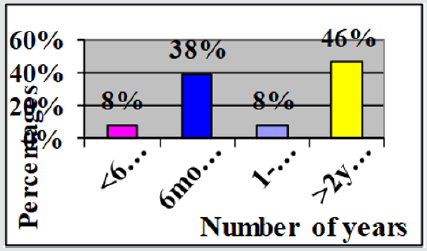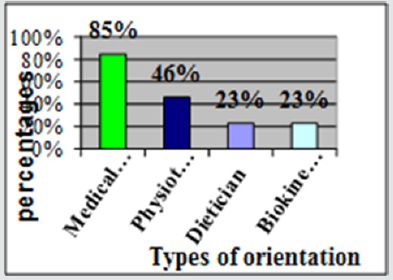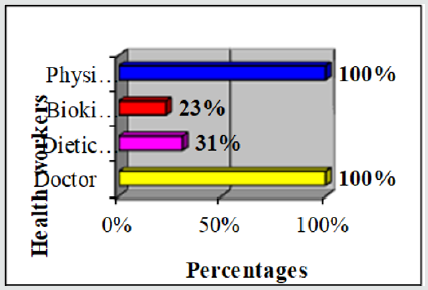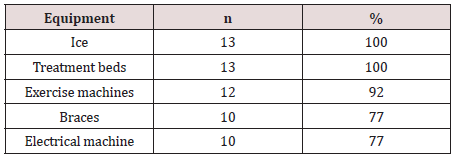
Lupine Publishers Group
Lupine Publishers
Menu
ISSN: 2643-6760
Review Article(ISSN: 2643-6760) 
Evaluating Team Managers’ Knowledge and Attitude and Importance the Role of Sports Physiotherapy in Indian Foot Ball Teams Volume 2 - Issue 5
Karthikeyan*
- Department of Physiotherapy, India
Received:April 24, 2019; Published: May 09, 2019
Corresponding author:Karthikeyan, Department of Physiotherapy, India
DOI: 10.32474/SCSOAJ.2019.02.000146
Abstract
Sports physiotherapists play a significant role in football teams. This role includes prevention of injury, treatment, education, and exercises. There is a dearth of information in some areas on the part of sports managers able to know on the importance and role of the sports physiotherapist in a team. The purpose of this study was to assess the knowledge of Indian team managers on the role of the sports physiotherapy. The objectives of this study were to asses’ team managers’ knowledge of the role of sports physiotherapists in the prevention and treatment of football injuries and evaluate their knowledge of the injuries managed by sports physiotherapists. A descriptive survey design with a close-ended questionnaire which was used in this study. A quantitative research approach was employed in this study. Descriptive statistics were used to analyze the data set and a rating scale was used to determine the knowledge of team managers about sports physiotherapy. The study results shown that out of the 16 teams in the PFL, 13 team managers participated in the study and their average knowledge was 79%. Five (38%) had administrative qualifications while eight (62%) did not include their qualifications. All 13 respondents indicated that warm up, cool down and stretching reduces the risk of injuries. Eleven (77%) reported that prophylactic strapping reduces risk of injuries. All participants agreed that sports physiotherapy treatment includes massage, electric machines and ice. They also mentioned that exercises can be done by the sports physiotherapist, though only three (23%) believed that the sports physiotherapist could conduct physical training. This study revealed that team managers have good knowledge of the role and the importance of the sports physiotherapist in football, with regard to prevention and treatment strategy of injuries among sport population.
Keywords: SP; PT; EBP; PRICER
Introduction
There are evidence-based treatment protocols on the clinical management of injuries in football. The sports physiotherapist’s role includes prevention of injury, treatment, education, and exercises [1]. It is also indicated that stretching before and after exercise reduces the risk of injuries and reduces muscle soreness in sports injuries [2]. The rehabilitation is an approach which emphasizes controlling inflammation, restoring muscle balance, improving soft tissue flexibility, enhancing proprioception and neuromuscular control, and efficient returning to sports [3]. The rehabilitation consists of four phases. The first phase is limiting additional injury and controlling pain and swelling by rest and applying ice, compression, and elevation. The second phase is to improve strength and flexibility of the injured structures by starting with isometric exercises as soon as possible after injury [4]. The third phase is progressive improvement of strength, flexibility, proprioception, and endurance training until near-normal function is attained. The last phase is to return to exercises and sports painfree [5]. The emphasis of care at the fourth phase of rehabilitation is the introduction of functional exercises [6]. Literature on team managers’ knowledge of the role of sports physiotherapy in sport teams is limited [7]. It is not very clear whether team managers understand the importance of fully rehabilitating the injured player before he returns to sport [8]. The literature shows that professional players often play and train while not fully fit and are, therefore, exposed to a high risk of re-injury [9]. Players are often put under pressure by their club managements to play while still injured. Some players tend to play in spite of not being fully rehabilitated owing to pressure from supporters, the coach, other players and the management of the team; they fear losing their positions and support [10].
Significance of the Study
Functional sports rehabilitation treatment professional: hopefully the information yielded by the study will help to create an awareness of the lack of knowledge of sports personnel regarding the role of functional sports rehabilitation treatment in football Statutory bodies: both the Indian Football Association (IFA) and PFL will be provided with copies containing a summary of the research report, which will hopefully help them develop an effective medical team, provide quality assurance and improve service delivery
Team Managers: it is hoped that the outcome of this study will inform team managers of the role of functional sports rehabilitation treatment in team sports
Aim of the Study
The aim of the study was to establish what team managers in the Premier football League (PFL) know regarding the role of functional sports rehabilitation treatment in Indian football teams.
Objectives of the Study
a) To establish team managers’ knowledge regarding the role of functional sports rehabilitation treatment in prevention and treatment of football injuries.
b) To find out whether team managers know the types of injuries and which specific sports injury treated through by sports physiotherapists.
c) To determine whether the team managers are familiar with the type of equipment which is prescribed through by sports physiotherapists?
Methodology
Sample Size and Selection
All 16 teams’ managers of all PFL teams were contacted to participate in the study.
Inclusion Criteria
Inclusions: all the team managers in the PFL teams were involved in the study, regardless of age, experience and gender.
Exclusion Criteria
Only PFL team managers who are directly involved with the players and are involved in the top management of teams were involved in the study.
Instrument
A self-constructed questionnaire was used, which consisted of closed and open-ended questions. The questionnaire was divided into four sections:
a) Section A sought demographic information of the participants which included number, gender and duration of service of sports physiotherapists in the team
b) Section B sought information on the team managers’ knowledge of prevention and treatment of injuries
c) Section C captured information on the knowledge of the type of injuries that can be managed by sports physiotherapists
d) Section D gathered information on the knowledge of the type of equipment used by sports physiotherapists.
Data Collection Procedure
A list of all the participants was obtained from IFA. The questionnaires were posted to all the PFL team managers. The following documents were attached: information sheet, which described the purpose of the study to the participants; an informed consent form that had to be signed; a stamped self-addressed return envelope. The team managers were requested to return their response within two weeks of receiving the questionnaire. A code number on the envelope was used to monitor responses.
Data Analysis
A descriptive statistical procedure was used to analyze the data. The correct answer was rated as one (1) and the incorrect answers as zero (0). The highest possible score was 21 points. Each participant total score was converted into percentages. The knowledge was classified into three categories: poor, fair or good. Poor knowledge was indicated by a score of less or equal to 40%; fair knowledge by a score of 41-60%; and good knowledge by a score of 61-100%.
Results
Response Rate
Sixteen 16 questionnaires distributed to the team managers, 13 were returned giving an overall response rate of 81%. In the first mail, there was a response rate of 50%; in the second mail, 20%, and in the third, a response rate of 11%.This is regarded as a good response rate because more than 50% of the responses were received. The percentages which are presented in the graphs and tables are of the 13 team managers responded and thus taken as 100%.
Demographic Information and Experiences of Team Managers
Demographic characteristics of the respondents are presented according to years of experience, number of teams managed, ethnicity and qualifications of the team managers. All the respondents who participated in the study were males.
Managers’ Working Experience
The graph below presents the results on the working experience of the team managers (Figure 1)
The results in the abovementioned graph show that only six (46%) of the respondents have worked for more than two years, five (38%) have worked six months to one year and one ( 8%) have worked fewer than six months.
The Number of Teams Managed by the Respondents
The results indicate that nine (69%) of the team managers have managed more than one team and that four (31%) have managed only one team.
Qualifications of the Team Managers
The results show that five (38%) of the PFL team managers have management qualifications, and that their qualifications are from India. The remaining eight (62%) did not respond to the question.
Workshops and Courses Attended by the Respondents
The results show that eight (62%) of the team managers attended medical courses or workshops, whereas only five (38%) did not attend. The topics of the medical workshops mostly attended by the team managers were dietetics, three (23%), functional sports rehabilitation treatment, two (15%), and three (23%) were in medicine (Table 1).
Table 1 Shows that the frequency of meetings between team managers and medical teams was as follows: weekly six (46%), monthly five (39%) and other two (15%).
Figure 2 above show that all 13 (100%) team managers that participated in this study had medical doctors and sports physiotherapists for the teams.
Figure 2 above show that all 13 (100%) team managers that participated in this study had medical doctors and sports physiotherapists for the teams.
Figure 3 shows that eleven (85%) of respondents have attended orientation conducted by medical doctors, six (46 %) by sports physiotherapist, three (23%) by dietician and biokineticist. Team managers’ knowledge of preventative strategies, treatment of injuries, types of injuries and involvement of functional sports rehabilitation treatment in football the following table presents the results in terms of prevention, types of condition and types of treatment used by sports physiotherapists (Table 2).
The total score for all participants is 273, the score obtained was 215.The score obtained was divided to the total sore and was multiply by hundred (215/273 x 100=78, 9). The average team managers’ knowledge regarding prevention, treatment and type of injuries was 79%.
Discussion
The current study is the first to describe the knowledge of team managers on the role of functional sports rehabilitation treatment in football. It is necessary for team managers to have good knowledge of the role of functional sports rehabilitation treatment in order to prevent and properly manage the injured players in their teams [11]. In terms of the response rate, initially 50% responded; after the first follow-up 20% and on the third follow-up 11%. The total response rate was 81% which is good and who report that 60% upwards is a good response rate for a study. Notwithstanding its limitations, this study highlights the level of team managers’ knowledge of the role played by functional sports rehabilitation treatment in football.
Demographic Information
With respect to the qualifications of the team managers in the PFL, the majority (62%) did not respond. The 38% that did not respond have management qualifications which were all obtained in India. The importance of sports managers having broader qualifications in sports management, which should include sports marketing, sports finance, information management, human resource management in sport, and sports economics. The majority of the team managers (62%) have attended medical course workshops. It is very important for team managers to attend basic medical workshops in order to become medically orientated. This was supported by a study done by Cunningham and Jackson (2002) on an audit of first aid qualifications and knowledge among team officials in English football leagues. Their study found that 80% of team officials do not have first aid qualifications. In the current study, it was a positive indication that most of the team managers had attended a medical course in order to be able to support their players when injured. Regarding the level of working experience of the PFL team managers, 46% have spent more than two years, 8% have spent 1-2 years and 47% less than a year managing teams. In terms of number of teams managed, 61% have managed more that one team, while 31% have managed only one team Knowledge of the role of sports physiotherapists in prevention of injuries In general the results show that team managers have good knowledge of the role of prevention of injury in football even though some limitation on the instrument was observed.
Rehabilitation
It was also found that almost all the team managers know that playing with injury could cause disability while only a few (31%) are unaware. It is encouraging to see that the majority of the team managers understand that playing with injury leads to re-injury. Hopefully they will support their players when they are injured, despite limited evidence on the specific knowledge of team managers about disabilities. Premature return of players to sports leads to disability in future.
Team Managers’ Knowledge of the Role of the Sports Physiotherapist in the Treatment of Football Injuries
The current study shows that team managers have good knowledge of the role of physiotherapeutic treatment of sports injuries which includes ice and massage, even though a limitation on treatment modalities was observed in the current study instrument. The inclusion of the other treatment modalities could alter the results.
Knowledge of Types of Injuries
The results show that most of the respondents agree that sports physiotherapists can treat back pain (100%), joint pain (92%) and ligament pain (85%). This indicates that team managers have a good knowledge of types of injuries/conditions which can be treated by the sports physiotherapist. It reveals that team managers provide the necessary support when a particular player is injured. There is, however, limited evidence of team managers’ specific knowledge of the role of functional sports rehabilitation treatment in the types of injuries managed in sport. Some of the studies noted that joints injuries are common in sport.
Knowledge of Equipment
The current study indicates the encouraging fact that team managers have good knowledge of the various types of equipment such as electrical machines and braces, bandages and treatment beds that can be used by sports physiotherapists. This means that team managers support their sports physiotherapists when they need particular equipment to manage football injuries.
Conclusion
This study set out to establish whether team managers of the PFL teams have knowledge of the role of functional sports rehabilitation treatment in football in India. The study results reveal that 79% of team managers have good knowledge of functional sports rehabilitation treatment which includes prevention, treatment, rehabilitation, types of injuries and types of equipment. The researcher acknowledges that the limitations regarding the instrument used and limited literature may have influenced the results. This study will form the baseline for future studies, since is the first study which was done.
Recommendations
In the light of the findings of the current study, the following recommendations are made:
I. Females should be considered for posts in PFL management in accordance with the Employment Equity Act which states that: ‘a designated employer must implement affirmative action measures for designated groups to achieve equity’.
II. The outcome of this study reveals some draw backs in the appointment methods of physiotherapists; it is recommended that appropriate procedures along appropriate labor practice be followed.
III. A further study could be carried out by using both a qualitative and quantitative research approach. This would perhaps provide further insight into the knowledge of team managers
IV. The Indian Association Physiotherapy, in conjunction with the other medical disciplines, should establish basic sports courses for sports team managers on the role of physiotherapy in sports, as this could enhance the management of football in India.
Limitations
a. The validity and reliability of the instrument should be revised for future studies.
b. A larger sample size is recommended for further studies.
Conclusion
The results of the studies indicate that football team managers are aware that physiotherapy plays a role in prevention, treatment, rehabilitation, and types of equipment. However, the researcher acknowledges that the limitations pertaining to the current study may have influenced the results, and that further studies should be done in which a qualitative approach is included and the instrument reviewed.
References
- Arava D, Parkka D (2003) Effectiveness of Rehabilitation in sports injuries. British Journal of Sports Medicine 3(5): 23-35.
- Bostwick, G J , Kyte (1981) Measurement .In Grinnell, R.M. (Ed), Social work research and evaluation. Itasca, IL; Peacock. P106
- Christopher, E.B (1993) Prevention methods for sports injuries. 12th ed. Philadelphia: Churchill Livingstone, pp. 178.
- Ekstrand J, Walden M, Hagglund S (2004) A congested football calendar and wellbeing of players. British Journal of Sports Medicine 38: 493-497.
- Fuller CW, Walker J (2006) Quantifying the functional rehabilitation of injured football players. British Journal of Sports Medicine 40(2): 151- 157.
- Grygorowicz M, Kubacki K, Rzepka R, Bacik B (2007) Effect of eccentric exercise on balance ability in female football players. British Journal of Sports Medicine 41(2): 123-124.
- Jowett A (2005) Science and football. British Journal of Sports Medicine 39(2): 245-246.
- Kennet J, Hardaker N, Hobbs S (2007) Cooling efficiency of four common cryotherapeutic agents. Journal of Athletic Training 42(3): 343-348.
- Vairo GL, Miller SJ, McBrien NM, Buckley WE (2009) Systematic review of efficacy for manual lymphatic drainage techniques in sports medicine and rehabilitation: an evidence-based practice approach. Journal Man Manip Ther 17(3): e80-e89.
- Lysen RJ, Stereverlynck A, Van den Auweele Y, Lefevre J, Renson L, et al. (1984) The predictability of sports injuries. Sports Medicine 1(1): 6-10. work. Journal of Sports Medicine 31(14): 985-995.
- St John Ambulance Australia (1989) Australian first aid. St John Ambulance Australia, Canberra 1: 23-45.

Top Editors
-

Mark E Smith
Bio chemistry
University of Texas Medical Branch, USA -

Lawrence A Presley
Department of Criminal Justice
Liberty University, USA -

Thomas W Miller
Department of Psychiatry
University of Kentucky, USA -

Gjumrakch Aliev
Department of Medicine
Gally International Biomedical Research & Consulting LLC, USA -

Christopher Bryant
Department of Urbanisation and Agricultural
Montreal university, USA -

Robert William Frare
Oral & Maxillofacial Pathology
New York University, USA -

Rudolph Modesto Navari
Gastroenterology and Hepatology
University of Alabama, UK -

Andrew Hague
Department of Medicine
Universities of Bradford, UK -

George Gregory Buttigieg
Maltese College of Obstetrics and Gynaecology, Europe -

Chen-Hsiung Yeh
Oncology
Circulogene Theranostics, England -
.png)
Emilio Bucio-Carrillo
Radiation Chemistry
National University of Mexico, USA -
.jpg)
Casey J Grenier
Analytical Chemistry
Wentworth Institute of Technology, USA -
Hany Atalah
Minimally Invasive Surgery
Mercer University school of Medicine, USA -

Abu-Hussein Muhamad
Pediatric Dentistry
University of Athens , Greece

The annual scholar awards from Lupine Publishers honor a selected number Read More...









